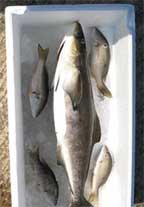|
 |
|
Esta página no está disponible en español. The Miami Herald Cobia Are An Environmentalist's Dream And A Diner's Delight By Linda Bladholm September 7, 2003
That is just what Jimmy O'Hanlon and Carlos Sanguily of JC Seafood are doing, working with Daniel Benetti, director of the aquaculture program at the University of Miami, and his partners Brian O'Hanlon (Jimmy's nephew) and Joe Ayvazian of Snapperfarm, an operation based on environmental sustainability. Their ''farm'' is two galvanized steel-and-mesh pods, each large enough to hold 38 tractor trailers, moored several miles off the coast of Culebra, Puerto Rico. The pristine water is the perfect temperature and its fast flow acts as a natural filter. One pod holds the cobia now being harvested; the other is home to mutton snapper that they expect will be big enough for market early next year. Hatched fingerlings are fed pellets made of fish and corn meal, soybean meal, vegetable fibers and yeast extracts, with no growth hormones, antibiotics or pigments added. There are no harmful pollutants or negative impact on the coastal mangrove swamps or coral reefs, UM's Benetti says. Best of all, these politically correct fish, related to dolphin and also called black kingfish, taste fantastic. ''We think it will be bigger than tilapia,'' says Benetti, referring to the species that has until now cornered the farm-raised market. Farm-raised cobia are whiter and have more fat, making them tastier with less granular flesh than their hard-swimming wild brethren. In a tasting held at Pescado in the Village of Merrick Park, executive chef Peter Hansen showcased its versatility. Starters included coconut tempura cobia and tiraditos (Peruvian-style sashimi). Cobia just might be best raw. The supple slices are light and delicate but durable and not fishy tasting at all. When cooked the flesh is gorgeous, too -- pure white, muscular, mild and flaky, as in Hansen's main course of pan-seared cobia fillets atop black-bean polenta with a salsa of chopped Kalamata olives, sun dried tomatoes, feta, fresh basil and red wine vinegar. Cobia would also be great steamed, baked or broiled. Or mince the meat, form it into fish balls bound with egg white and drop it into rice noodle soups. For an all-American treatment, grind it with chiles, fresh herbs and black pepper and make it into burgers, served with fruity ketchup. With the environmental cloud surrounding Chilean sea bass, the timing couldn't be better for a farm-raised fish that tastes even better than wild-caught. Cobia is $4.95 a pound whole, $10.95 filleted at Captain Jim's Seafood Market, 12950 W. Dixie Hwy., North Miami, 305-892-2812. Restaurants serving cobia include Pescado, Village of Merrick Park, 320 Avenue San Lorenzo, Coral Gables, 305-443-3474; Norman's, 21 Almeria Ave., Coral Gables, 305-446-6767; Nobu, 1901 Collins Ave., Miami Beach, 305-695-3232; and Café Ibiza, Village of Merrick Park, 370 Avenue San Lorenzo, Coral Gables, 305-443-8888. PAN-SEARED COBIA Peter Hansen, executive chef at Pescado, shared these directions for his spice-seared fillet. (Black cod or wahoo can be substituted for cobia.) Serve it with couscous and a wedge of lemon: • Heat the oven to 400 degrees. • Rub a large cobia fillet with olive oil, a little salt and garam masala (a blend of cinnamon, cloves, coriander, cardamom, black pepper, cumin, dried chiles, fennel, mace and nutmeg available at Indian markets). • Heat an oven-proof skillet over high heat; add oil and a little butter. • Carefully lay the fish in the pan and let it sear until the spice mixture forms a nice crust. • Remove the pan from the heat, turn the fish over carefully with a spatula and finish it in the oven for about 6 minutes. Makes 2 servings.
|

 Cobia are fast-growing even in the wild, but put these jut-jawed, cigar-shaped fish in a pen deep in the ocean and they go totally alpha, reaching 8 to 10 pounds in less than a year. A mutton snapper raised in the same conditions won't even be a pound, making cobia enticing as a profitable fish to farm-raise.
Cobia are fast-growing even in the wild, but put these jut-jawed, cigar-shaped fish in a pen deep in the ocean and they go totally alpha, reaching 8 to 10 pounds in less than a year. A mutton snapper raised in the same conditions won't even be a pound, making cobia enticing as a profitable fish to farm-raise.